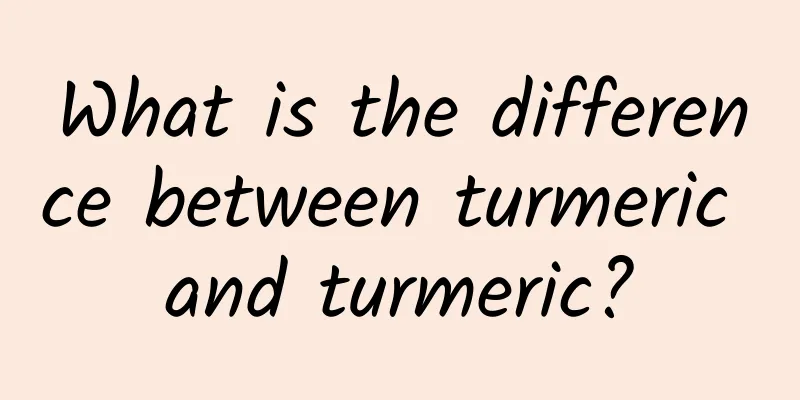What is the difference between turmeric and turmeric?

|
There are actually some differences between turmeric flakes and turmeric, so when you need to use turmeric flakes or turmeric, you should pay attention to the scientific understanding of the differences between them. Only by correctly distinguishing them can you better help yourself and inhibit cancer cells, promote menstruation and relieve pain, which is better for our health. The following is a detailed introduction to the differences between turmeric flakes and turmeric. The difference between turmeric and turmeric flakes The Chinese Pharmacopoeia {2000 edition} has clearly stipulated that turmeric and turmeric flakes are two medicines and should not be confused. Both belong to the ginger family and have basically the same nature, flavor and functions. Turmeric is the rhizome of Curcuma longa, and turmeric flakes are the rhizome of Curcuma aromatica. The medicinal properties of both are pungent, bitter and warm; both can invigorate blood circulation, promote qi circulation, unblock menstruation and relieve pain. The difference is that turmeric is suitable for treating pains in the heart, chest, flanks and abdomen caused by blood stasis, while turmeric slices are good for treating rheumatic pain in the shoulders and arms. [Prescription name] Turmeric, turmeric slices. [Source] It is the rhizome of Curcuma longa, a plant of the ginger family. [Nature and flavor] Bitter, pungent, warm. [Effects] It can promote blood circulation, stimulate qi flow, unblock menstruation and relieve pain. [Ingredients] Contains volatile oil, curcumin, etc. [Pharmacology] Curcumin can induce tumor cell apoptosis and inhibit tumor cell proliferation. It has an inhibitory effect on mouse sarcoma 180 animal transplanted tumors. Animal experiments on turmeric decoction and infusion have shown a choleretic effect, which can increase bile secretion, contract the gallbladder, and have an analgesic effect. [Application] (1) It is used to treat digestive tract tumors caused by qi stagnation, cold-dampness condensation, and internal obstruction of toxic blood stasis. Symptoms include chest tightness, epigastric pain, and lumps and distension under the hypochondrium. It is often used in combination with Citrus aurantium, Atractylodes macrocephala, Tangerine peel, Corydalis yanhusuo, Albizzia julibrissin peel, etc. (2) It is used for the treatment of bone metastasis of tumors caused by qi stagnation, dampness obstruction, and blood stasis, with symptoms such as limb pain, numbness, and joint discomfort. It is often used in combination with Achyranthes bidentata, frankincense, myrrh, Notopterygium wilfordii, Stephania tetrandra, etc. [Usually used dosage] 3~10 grams, decocted in water. [Note] It is not suitable for deficiency syndrome. By understanding the differences between these plants and health care medicines, we can try our best to avoid some adverse effects when using them. We also hope that everyone can pay more attention to the knowledge of these common sense in daily life, which can also play their anti-cancer effects in the treatment and relief of physical diseases. |
<<: What are the effects and functions of Perilla frutescens
>>: What are the effects and functions of turmeric slices
Recommend
Can you reach this pace? Diabetes risk may be reduced by 39% →
Compiled by: Gong Zixin Type 2 diabetes is a prog...
Can Pangdahai and wolfberry be soaked in water together?
The medicinal effect of Sterculia lychnophora is ...
During Tsinghua University's anniversary celebration, he became a hot topic. His academic title alone is enough to keep you hooked for a minute!
On the occasion of Tsinghua University's 113t...
The efficacy of Chinese medicine puffball
Puffball, also known as puffball, is shaped like ...
InfoWorld: Pinterest's development momentum exceeds Facebook: integrating social networking and e-commerce
Now, every time users share photo collections, Pi...
Deadly drowning! The number one killer of children! How to identify the early signs of drowning?
The World Health Organization's report on dro...
The efficacy and function of mountain tangerine abacus
Traditional Chinese medicine is very helpful in t...
The effect of boiling licorice and mung beans in water
Licorice and mung beans are foods that we often s...
In the animal world, why are males generally better looking than females? | Tutu Science Fiction
Q What animals are born from males? A There is on...
The efficacy and function of bougainvillea
Traditional Chinese medicine has always been the ...
The efficacy and function of fine-leaved peat moss
Do you know about fine-leaved peat moss? It is a ...
This setting in "Guardians of the Galaxy 3" has sparked heated discussion. Is there really an "anti-Earth" behind the sun?
In the recently released "Guardians of the G...
The efficacy and function of black grass
Black grass is a traditional Chinese medicine. In...
Today is Sunday, but I have to go to work! Why does taking a day off make people so exhausted?
The May Day holiday is coming soon, but before th...
A miracle in the history of science: the contribution of intuition goes beyond understanding
Faced with more than 60 known elements, all chemi...









